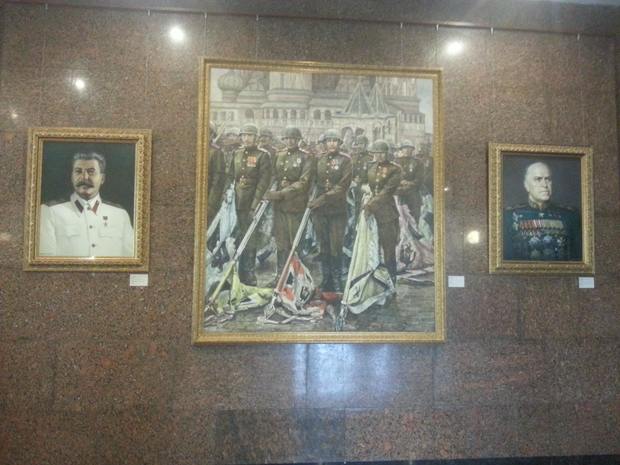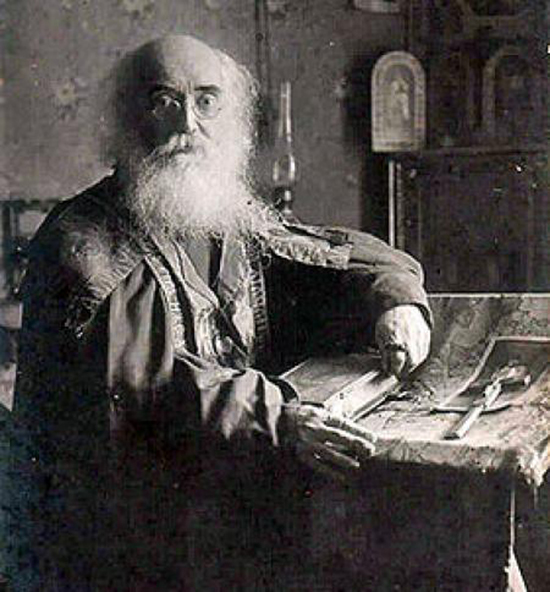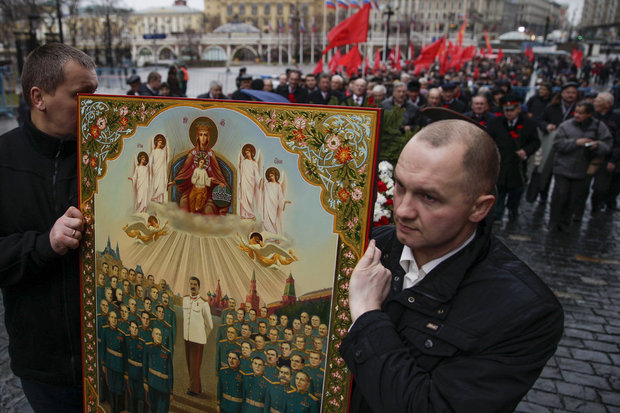Vsevolod Chaplin: ''Stalin adapted himself to soul of people at the right time, to their centuries-old intuitions''
Stalin and the future: the inevitability of the dispute. The column of Archpriest Vsevolod Chaplin
One of the most controversial figures of Russian history is Joseph Stalin. Despite the denounciation of the personality cult, the majority of Russians, according to polls, consider it necessary to establish monuments to the leader. A columnist of Realnoe Vremya Archpriest Vsevolod Chaplin, who has recently visited the Central Museum of the Great Patriotic War on Poklonnaya hill in Moscow, drew attention to the busts and pictures of Joseph Stalin. In today's newspaper column, written for our online newspaper, the priest wonders why people are so terribly afraid of him and, at the same time, extol to the extent of attempting to place him on the icons.
''There is no escape from the name and image of this person''
Stalin in Russia is not just ''more than Stalin'' but more than any other subject of historical debate about the future. Next to it there can be, perhaps, only the controversy surrounding Ivan the Terrible. The reason is clear. It was Stalin and Ivan IV who dared to destroy the ''progressive'' elite. Lenin and Trotsky destroyed the elite ''reactionary'', and along with them ordinary people. Peter the Great was also not very fond of ordinary people. They, in intuition of our liberals, can be hurt as well as ''reactionaries''. But the ''enlightened'', ''intelligent'', ''better'' people — no way. Some just cannot forgive this, unlike the death of millions of social ''aliens'', by definition. In the first place, because they know that the people's confidence in the layer of ''enlightened'' jerks is zero, and the thirst for justice in the society is very high. Any ''Kirov's assassination'', even symbolic, can lead to a repeat of the scenario of 80 years ago.
That is why they try to defame Stalin with their last bit of strength with Trotskyist boot or Zinovievsky boot. And most of all they attack, perhaps, the achievement of the Stalin era — the victory in the Great Patriotic War, after which Moscow regained almost all lost territory and controlled half of Europe.

''Nobody protests against the images of the leader — in the Museum as well as in social networks, where I posted a few photos after the excursion. Yes, there is no escape from the name and the image of this man: the history of the war is unthinkable without him.'' Photo: facebook.com/prot.v.chaplin
I have recently visited the Museum on Poklonnaya hill and saw a lot of images of Stalin, one of his sculptures and even installations in which the leader is ''alive'' — he is looking at the map, lighting a match, talking with Churchill, and at some point just looking with hard look at the leisured public (among other things, the majority of tourists are foreigners). Nobody protests against the images of the leader — in the Museum as well as in social networks, where I posted a few photos after the excursion. Yes, there is no escape from the name and the image of this man: the history of the war is unthinkable without him. Roosevelt and Churchill communicated with him without any fear and moralistic. His credibility is very high among people of Russia, and in Georgia his images can be seen everywhere, although they are increasingly becoming to have a folk-pop character. Total anti-Stalinism remained a marker of rapidly dying totalitarian liberals of the Soviet bottling…
''Not to bring the happiness of communism throughout the planet but to restore''
What is the reason of the success of Stalin, for which he is still respected? Is it only ''hard fist''? Trotsky's, by the way, was harder… I believe that the former seminarian, turned into bandit-Bolshevik, soon after the revolution realized that if to continue it indefinitely, it would devour all his children and including him. That is why he should not bring the happiness of communism throughout the planet but to restore and continue to build statehood, getting rid of those for whom the ''world revolution'' was most important. And those who maintained destructive anti-government fervour.
Stalin, perhaps, because of the upbringing in an ordinary family, as well as because of seminary education, at the right time managed to adapt to the soul of the people, under their centuries-old instincts, which contain the wisdom of the past as well as the image of the future. His actions in the 1930s and 1940s were consonant with traditional Orthodox Imperial geopolitics — middle Eastern, Balkan, central European. I think that he was influenced by one of the Seminary teachers — wise hieromonk Dimitry (Abashidze), whom the young Dzhugashvili kicked out from the theological school, but during the period of his omnipotence did not suffer much.

''I think that he was influenced by one of the Seminary teachers — wise hieromonk Dimitry (Abashidze), whom the young Dzhugashvili kicked out from the theological school, but during the period of his omnipotence did not suffer much.'' Photo: pravlife.org
The actions of the leader had no special political genius. Stalin just started to do what any adequate power did in Russia, even those of foreign origin or formally associated with the foreign ideology of Marxism. A power acting in Russia in spite of the deep will of the people and contrary to the Orthodox vector of the history is short-lived and certainly does not gain victories — except, perhaps, in civil wars, but their benefits are quickly lost.
''People will debate about Stalin for a long time''
So, for me Stalin is just a person appropriate to circumstances, provident and intelligent man. Not a genius and especially not a saint. Yes, today sometimes he is depicted on icons, but without the halo, among other generals. Even next to the saints, but not on par with them. There are also depicted many historical characters, which served as background for the manifestation of Holiness. And sometimes even… living bishops, politicians and businessmen, for example, when painting the Novospassky temple. The icons of Stalin (I've seen on the Internet) are certainly not canonical.
The more that there is no documentary evidence that the leader repented of his godlessness, persecution of the faith and the Church, of the death of innocent people (however, the red executioners definitely cannot be called innocent as well as those who betrayed the tsar and destroyed the Empire). If there was no repentance, the soul of Stalin is in hell. However, some of the memories have been preserved, supposing repentance. So, the officer in Stalin's guard Yury Solovyev stated that the leader was praying in one of Kremlin churches. That Stalin confessed to the Metropolitan Nikolai (Yarushevich) was said by the grandson of the Soviet leader Alexander Burdonsky and trusted person of Metropolitan Lyubov Peterson (the bishop told her about it shortly before the death).

''For me Stalin is just a person appropriate to circumstances, provident and intelligent man. Not a genius and especially not a saint. Yes, today sometimes he is depicted on icons, but without the halo, among other generals. Even near to the saints, but not on par with them.'' Photo: newsok.biz
They will debate about Stalin not just for a long time but while Russia exists. And those who are striving — sometimes justified — to revive the policy of ''strong hand''. And those are creepy by the story about the refusal of the leader to exchange the captured son for a German General — they themselves have children given in a ''voluntary hostage'' to the strategic enemy and they will certainly never go to war for the Homeland… Those will argue who are simply afraid of the great future of the country incompatible with the narrow-minded comfort and a peaceful sleep of the soul. I believe that the Lord will not allow Russia to fall asleep, to calm down, to abandon the special mission in the world. Therefore, large, epic pieces of its story will be for them an example, for some — a nightmare, but always a reason to stretch the mind and conscience.